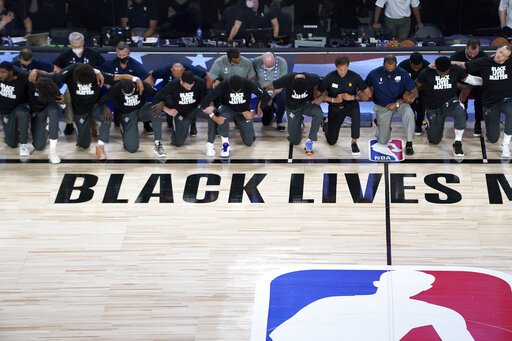Chuck Ross (Free Beacon)
The maker of the NBA’s official game balls is owned by a Chinese company accused of using Uyghur slave labor that has threatened to cut ties with the league for supporting pro-democracy protesters in Hong Kong.
In 2019, the Chinese-owned Anta Sports acquired Amer Sports and its subsidiaries, including the sporting goods maker Wilson. The NBA inked a deal with Wilson to provide game balls for the upcoming season. The league has also sold Anta brand shoes on its website.
The NBA has faced a drumbeat of criticism over its silence on China’s human rights abuses. While many of its superstars have defended social justice protests in the United States, the league has been largely quiet regarding China’s crackdown on pro-democracy protesters and its alleged use of slave labor.
The bipartisan Congressional Executive Commission on China recently called on the NBA to cut ties with Anta and other Chinese apparel companies over their use of labor from Xinjiang, where the Chinese government has forced more than one million Uyghurs into internment camps. Anta and the other targeted companies have sneaker endorsement deals with more than a dozen NBA players.
Anta, which is also the official uniform maker for the Olympics, withdrew earlier this year from a group called the Better Cotton Initiative, which had called on companies to end the use of cotton from Xinjiang. The Congressional Executive Commission said Anta and the other companies’ use of cotton from Xinjiang likely makes them “complicit in the use of forced labor.”
“We believe that commercial relationships with companies that source cotton in Xinjiang create reputational risks for NBA players and the NBA itself,” the commission said in a letter to the NBA players’ union on June 1.
Anta sided with the Chinese Communist Party in November 2019 after NBA executive Daryl Morey praised protests in support of democracy in Hong Kong. The company threatened to end endorsement deals with NBA players because of Morey’s comments, saying it “opposes any action that harms China’s interests,” Reuters reported.
Tencent, the Chinese telecom company, also refused to air some NBA games over the executive’s remarks. Tencent was part of the consortium with Anta that purchased Wilson’s parent company, Amer Sports, in March 2019. Anta owns 57 percent of the joint venture that controls Amer Sports and Wilson, according to the company’s latest financial report.
Wilson also produces sporting apparel as well as game balls for the NFL and NCAA basketball. Its basketballs are made in China, though it is unclear whether any materials are sourced from Xinjiang.
Neither Anta nor the NBA responded to requests for comment. Amer Sports declined to comment when asked about Wilson’s partnership with the NBA and the allegations against Anta. Wilson also did not respond to a request for comment.
The NBA and Wilson have not disclosed the terms of the game ball partnership, but both Wilson and the NBA see China as the league’s most lucrative foreign market. More than 640 million Chinese viewed NBA content during the 2018 season, the league has said.
One Wilson executive said after the deal with the NBA was struck in 2019 that the company’s growth will come from overseas, particularly China.
“We have a presence in China, which is a very fragmented market (for basketball sales) and a big opportunity for us,” said Kevin Murphy, the VP of Wilson’s basketball operations. “Our commitment to growing the game of basketball on the global stage is at the heart of Wilson and our new partnership with the NBA.”




